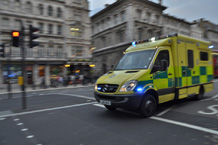
The research team developed a computer simulation to investigate the factors that most influence demand for ambulance services in the South West.
Ambulance call-out research leads to positive changes for ambulance service trust
Recently-published research investigating the reasons behind a rise in ambulance call-outs in the South West is already being used by a local ambulance service trust to work with commissioners to introduce positive changes – and to reinforce its track record for using research to develop its services.
The South Western Ambulance Service NHS Foundation Trust (SWASFT) asked researchers from the National Institute for Health Research Collaboration for Leadership in Applied Health Research and Care South West (NIHR PenCLAHRC), to investigate the annual growth in activities relating to 999 incidences – a rise of 24 per cent over the past four years.
The research team developed a computer simulation to investigate the factors that most influence demand for ambulance services in the South West. The simulation found that falls in the elderly scored much higher than other known sources of high demand, followed by users of adult mental health services.
Although the resulting study was only published recently in the Journal of Paramedic Medicine, the NIHR PenCLAHRC team shared their results with SWASFT early so that the Trust could use the results to work with commissioners to develop services.
The study suggested that adopting the recommendations of existing guidance around falls in the elderly, and the development of support strategies to help adults with mental health requirements use the ambulance service appropriately, could significantly reduce the demand for ambulances.
Taking the results of the research, SWASFT is working with commissioners and stakeholders to develop services for those who are frail and experience a fall. The Trust has developed a falls strategy and has set up a frailty group to coordinate the work across the 10 counties it serves. This work includes the development of falls pathways to ensure patients who have had a fall are referred to the right multi-disciplinary team and receive appropriate assessment and support, as well as working with care providers (Care and Nursing Homes and Domiciliary Care) to support patients who are at risk of falling within this particular setting.
The study was led by Dr. Daniel Chalk, Research Fellow in Applied Healthcare Modelling and Analysis, NIHR PenCLAHRC and University of Exeter Medical School.
He said: “Little work had been done to analyse the reasons behind the rise in ambulance call-outs in the South West, and the request from SWASFT for us to investigate this phenomenon has been timely. As a consequence not only have we achieved some clarity about call-out sources where there was none before, we have also identified a situation where, with different parts of the health service working together, we could mitigate a growing area of concern. We are delighted that SWASFT has taken the results of our research and used them to engage with commissioners on service development.”
Sarah Black, Research and Audit Manager from SWASFT, added: “If we are to tackle the growing numbers of 999 calls we need to understand where they are coming from and why, which is why this research is important to us. The findings are playing a vital role in our ongoing discussions with commissioners about how we develop our service.”
Professor Ken Stein, Deputy Director of NIHR PenCLAHRC, commented: “This is an excellent example of the ‘you ask – we research – you do’ model which sits at the heart of the CLAHRC programme across the country. Locally-driven research projects can result in powerful and effective changes to practice and policy not just in the area where the research has been commissioned, but also further afield where applicable.”
Date: 3 August 2016
